Holocaust denial and distortion online have become increasingly common. A recent rise in Holocaust denial and distortion relates to an incident that occurred at the end of November.
In this incident a spate of comments distorting and denying the Holocaust appeared online after the chairperson of the International Film Festival India’s jury, Israeli screenwriter and film director Nadav Lapid, criticised the inclusion of the film The Kashmir Files.
The film is about the exodus of Hindus from Kashmir in the 1990s and tells the fictional story of a university student who discovers his Hindu parents were murdered by Islamist militants. The movie explores the history of Kashmir, a sensitive subject in India.
Lapid described the film as “vulgar” and “propaganda” and expressed that he was “shocked” it was included in the competition category. His comments have upset many people. Some social media users took the opportunity to explain how the expulsion and killings of Kashmir’s Hindus is a traumatic and neglected part of the region’s history. Others have pointedly used Lapid’s comments, and the fact that he is Jewish, as an opportunity to deny and distort the Holocaust.
This briefing has three parts:
- An explanation on Holocaust denial and distortion
- Examples of Holocaust denial and distortion arising from discourse around the Kashmir Files.
- Discussion explaining why Holocaust denial and distortion like this is a problem that causes harm.
What is Holocaust denial and distortion?
The International Holocaust Remembrance Alliance (IHRA) provides a working definition of Holocaust and distortion. It describes Holocaust denial as “discourse and propaganda that deny the historical reality and the extent of the extermination of the Jews by the Nazis and their accomplices during World War II.”
The definition explains that “Holocaust denial in its various forms is an expression of antisemitism. The attempt to deny the genocide of the Jews is an effort to exonerate National Socialism and antisemitism from guilt or responsibility in the genocide of the Jewish people. Forms of Holocaust denial also include blaming the Jews for either exaggerating or creating the Shoah for political or financial gain as if the Shoah itself was the result of a conspiracy plotted by the Jews. In this, the goal is to make the Jews culpable and antisemitism once again legitimate.”
A non-exclusive list of examples of Holocaust distortion is included in the definition. The examples are:
- Intentional efforts to excuse or minimize the impact of the Holocaust or its principal elements, including collaborators and allies of Nazi Germany
- Gross minimization of the number of the victims of the Holocaust in contradiction to reliable sources
- Attempts to blame the Jews for causing their own genocide
- Statements that cast the Holocaust as a positive historical event. Those statements are not Holocaust denial but are closely connected to it as a radical form of antisemitism. They may suggest that the Holocaust did not go far enough in accomplishing its goal of “the Final Solution of the Jewish Question”
- Attempts to blur the responsibility for the establishment of concentration and death camps devised and operated by Nazi Germany by putting blame on other nations or ethnic groups
Social media user’s response to Lapid’s comments about The Kashmir Files
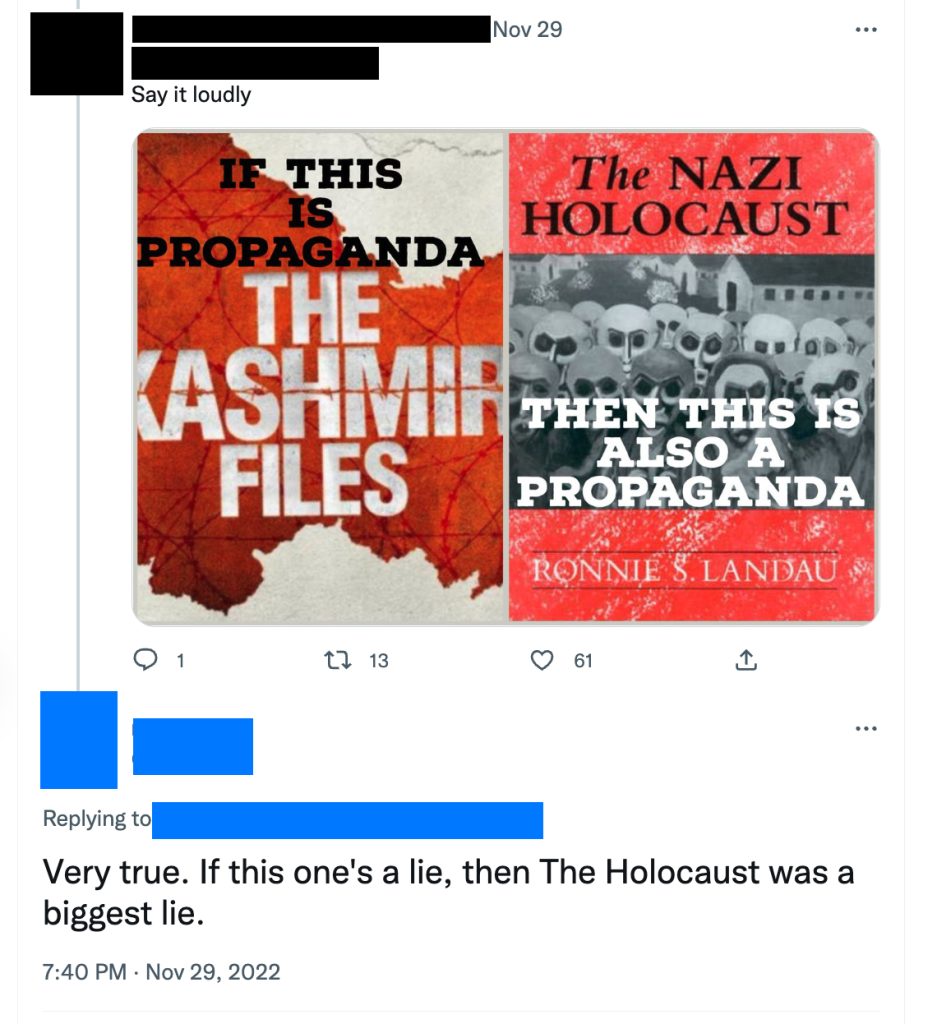
In this tweet, the first user posts an image to suggest that if The Kashmir Files is propaganda, then the Holocaust must be too. Rather than comparing the Kashmir Files to a movie about the Holocaust, this user claims that a non-fiction book The Nazi Holocaust by an historian and educator is propaganda, thereby questioning the Holocaust as an historical event, rather than just its portrayal in a movie. This evokes the antisemitic canard that Jews use the history of the Holocaust for political purposes.
This Tweet received a reply saying, “The Holocaust was a biggest lie.” This is outright denial of the Holocaust.
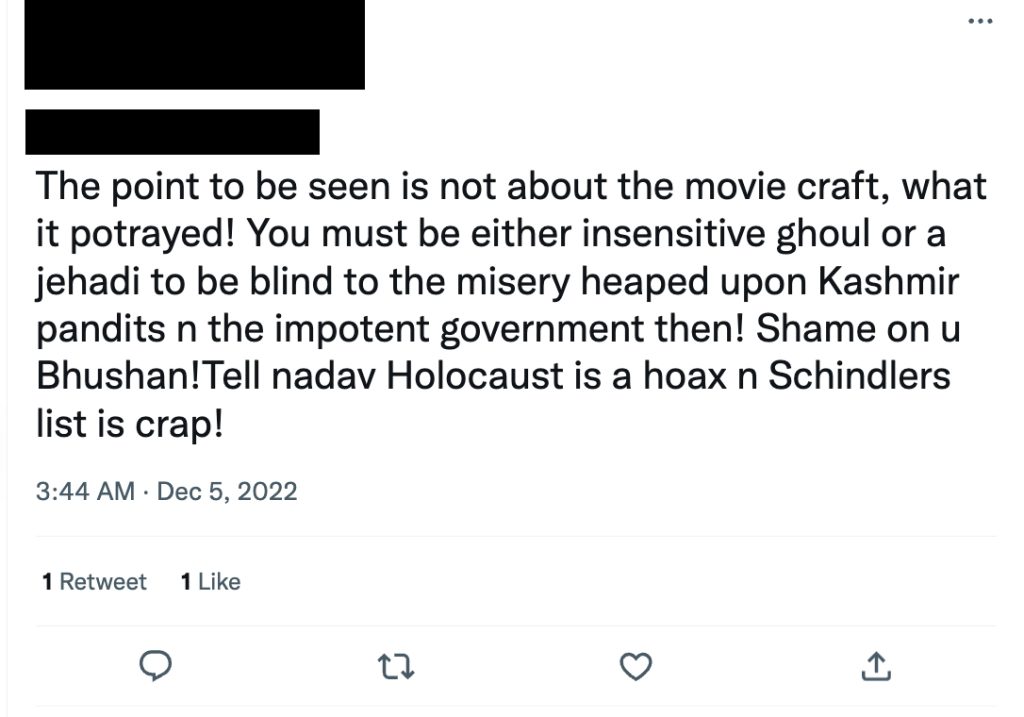
This Twitter user also uses language that denies the Holocaust by calling it a “hoax”. IT appears to be done to hurt Lapid, not out of any serious belief in the statement. The tweet also calls Lapid an “insensitive ghoul” and “jehadi” (sic) which has the inference that he is as bad as the people who killed and forced Kashmiri Hindus into exile.
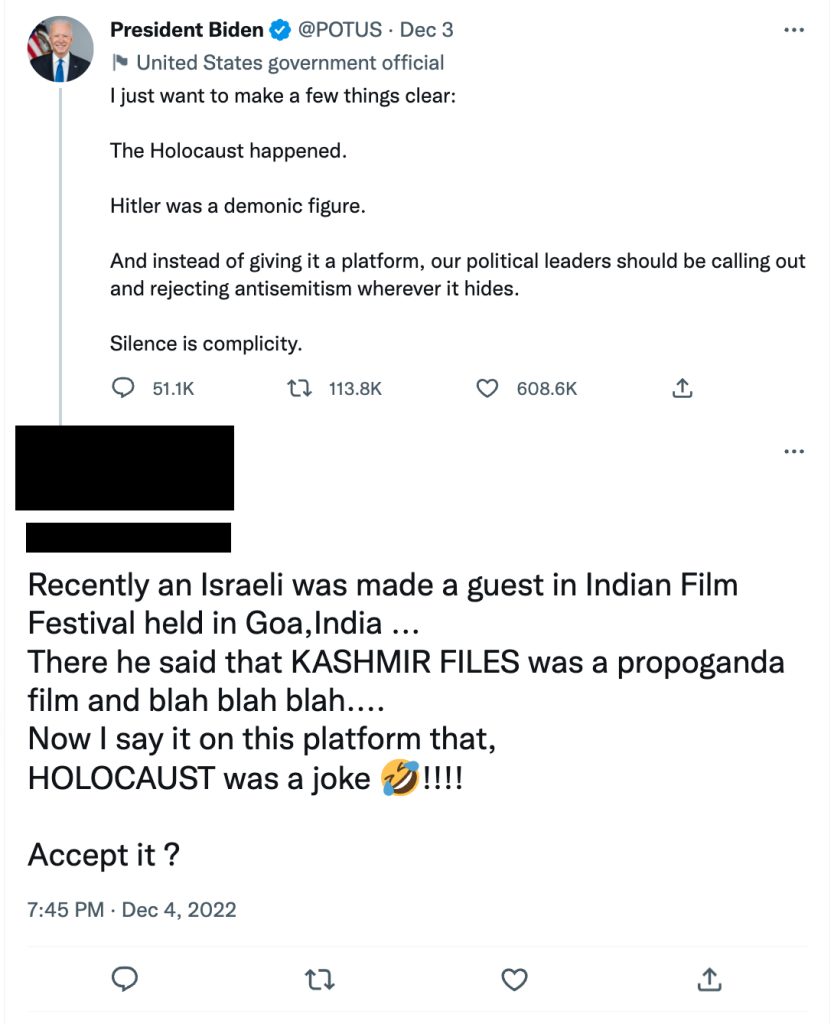
Despite the significant increase in antisemitic discourse and Holocaust denial in the United States, a user replied to President Joe Biden’s post condemning Holocaust denial by calling the Holocaust a joke, almost as if criticism of The Kashmir Files was akin to the extreme public antisemitism of Kanye West.
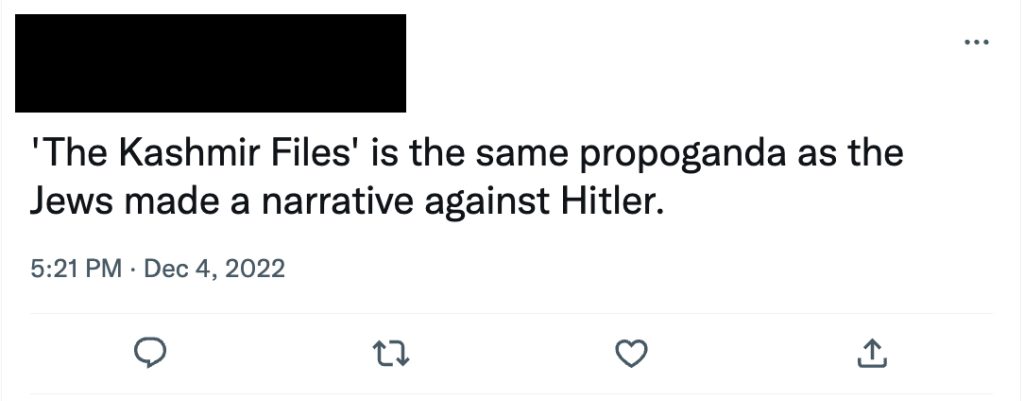
This Tweeter implies that the Holocaust did not happen and frames Hitler as an innocent victim, and Jews as the guilty party by creating a story.
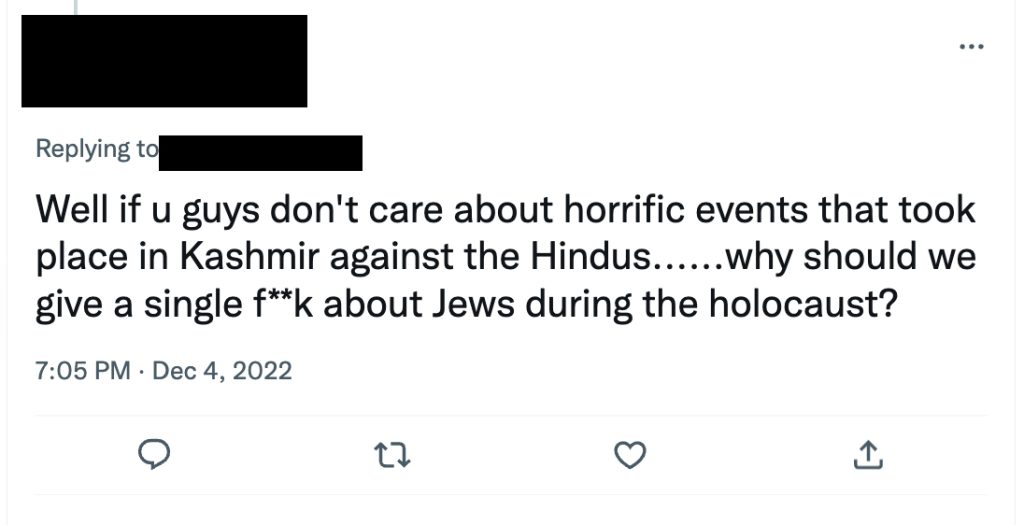
In this Tweet, the user shows that their support and care of Jewish people is transactional and depends on the support of an Israeli director. Here, all Jews have been held collectively responsible for the actions of just one Israeli.
The rhetoric that “if The Kashmir Files is propaganda, then so is the Holocaust” has been a common feature of many comments on the matter, as seen in the following Tweets.
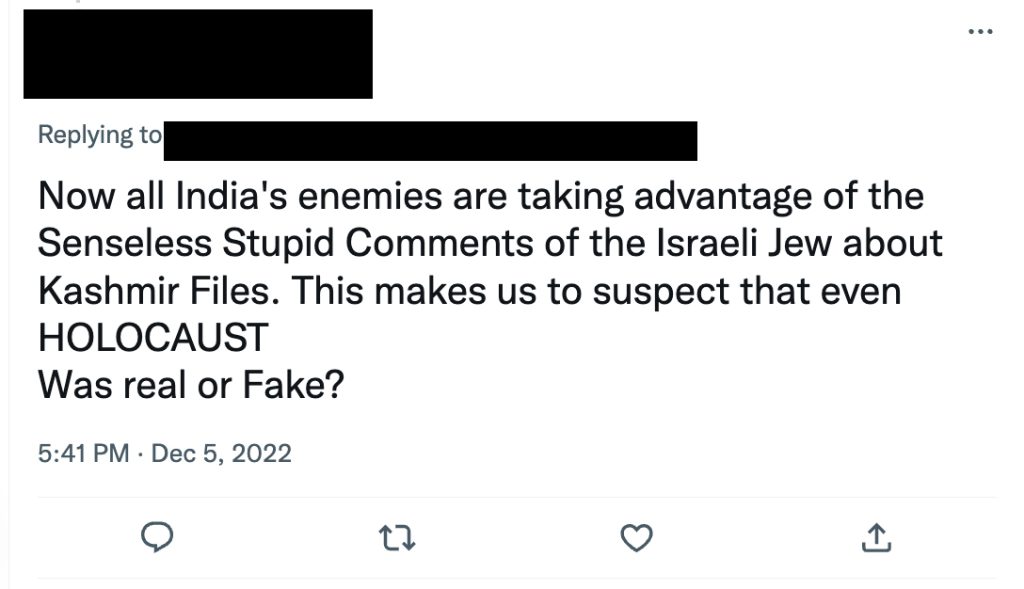
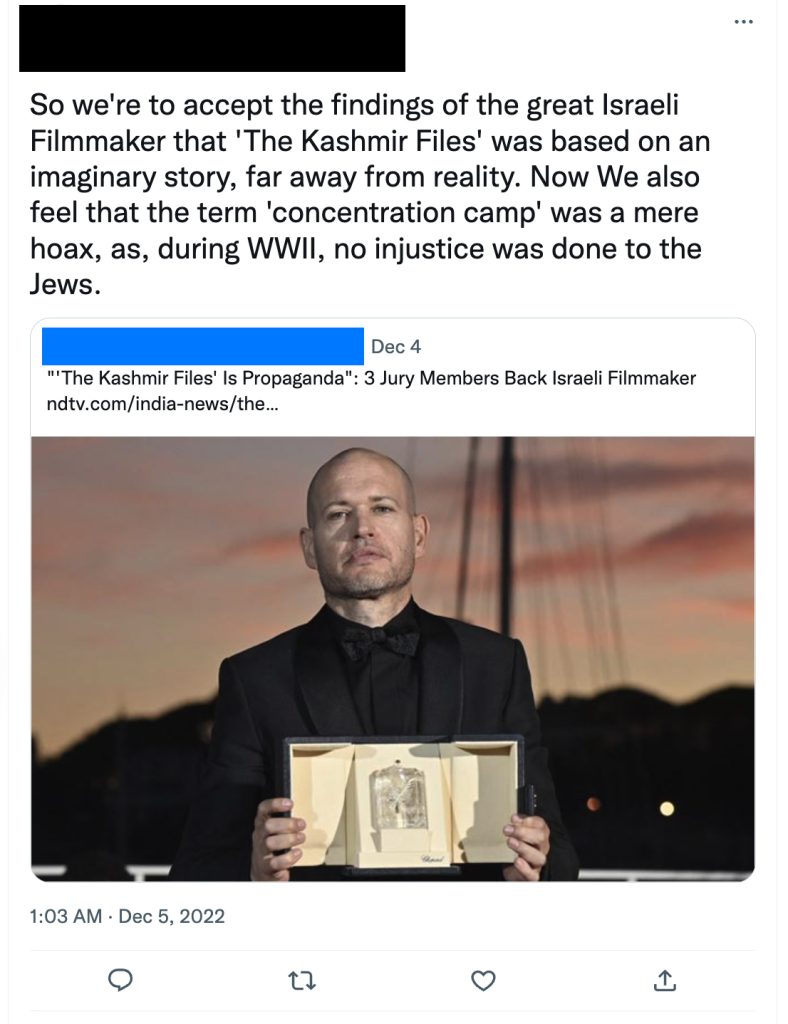

A problem with all of the Tweets shown in this briefing is that the Holocaust is directly compared with the Kashmir exodus, as exemplified in the Tweet below.
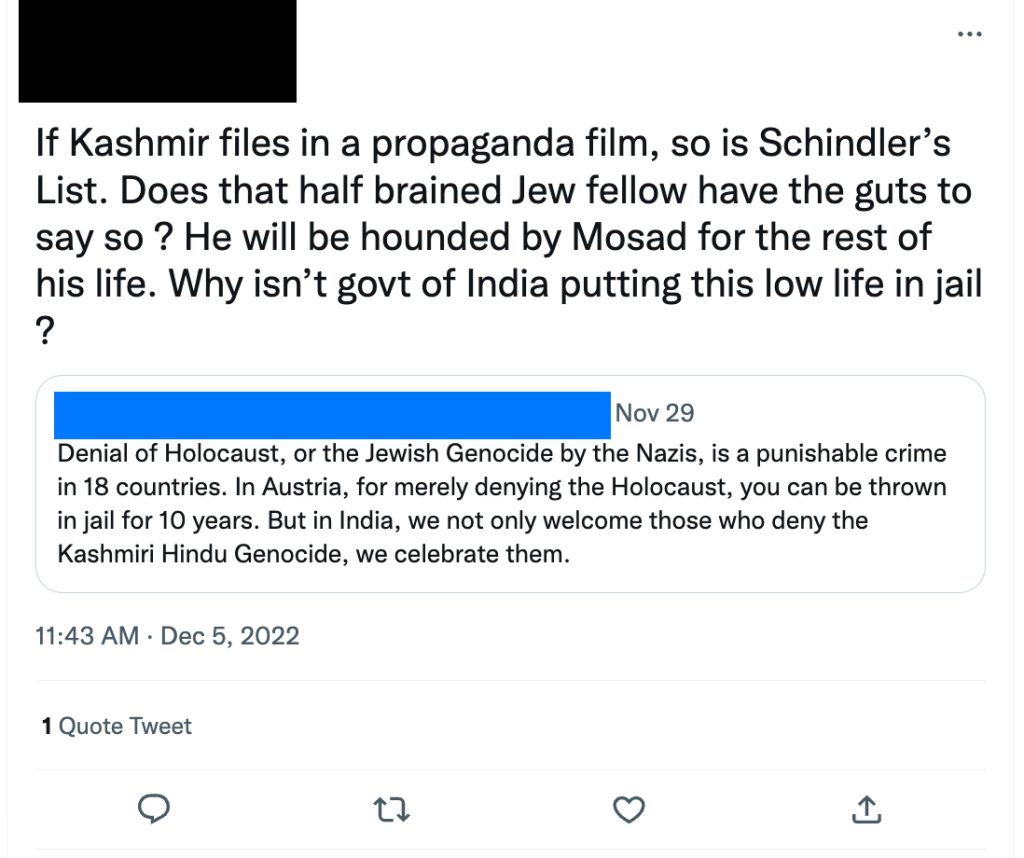
There is little benefit in comparing tragedies. Each should be understood in its own terms.
In the Holocaust, two thirds of European Jews were killed by the Nazis and their collaborators. This was more than six million Jewish people, including 1.5 million Jewish children. The aim of the Nazis was to make Europe Judenrein (free from Jews), and the means to achieve this end was industrial and systematic mass murder.
As a result of rising violence in Kashmir against the Indian administration, it is estimated that up to 100,000 of the 120,000-140,000 population of Kashmiri Hindus fled the region. Indian Home Ministry recorded that over 200 Hindus had been killed in Kashmir between 1988 and 1991.
Both events will be traumatising for those who survived, and will lead to intergenerational trauma. A comparison rights distorting understanding of the historic realities.
Why Holocaust distortion and denial is a problem
Holocaust distortion and trivialisation can normalise Holocaust denial. For example, Neo-Nazi Andrew Anglin has said that the best way to encourage Holocaust denial is through trivialisation and by making Holocaust jokes. Research has suggested that an internet culture of irony and in-jokes has drawn even unindoctrinated people towards the far-right, resulting in an increase of antisemitism, white supremacism and hate speech online.
Holocaust denial and distortion is dangerous. Not only does it insult the memory of the victims and hurts Holocaust survivors and their descendants, it also helps perpetuate antisemitism and can fuel violent extremism.
Help us stop online hate by reporting content like this to our Fight Against Hate software. You can also help us by making a donation, which will directly contribute to our work of documenting and removing hate speech, including antisemitism and Holocaust denial, from social media.
